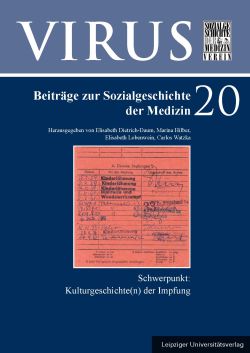
VIRUS Band 20, pp. 189-212, 2022/06/14
Schwerpunkt: Kulturgeschichte(n) der Impfung

1958, three years before the nationwide implementation of the governmentally organised mass vaccination campaign against poliomyelitis using Sabin’s vaccine, the Austrian federal province of Vorarlberg was seized by an outbreak of infantile paralysis. Due to the enormous number of infections and the high mortality rate, this epidemic was the most severe in the history of Vorarlberg. In the spring of 1958, regional authorities in most of the Austrian provinces started programs of serial vaccinations using the Salk vaccine. On account of the expenses expected, the federal government of Vorarlberg, however, chose not to follow the example of its neighbouring countries and refused to organise a comprehensive vaccination campaign. Given these circumstances, citizens, physicians, and medical societies requested to immediately launch a public immunisation programme. Their demands were communicated to the governmental authorities via the regional newspaper Vorarlberger Nachrichten. After an introduction into the epidemiology of polio in Vorarlberg and the state of implementation of the Salk vaccine in 1958, the paper analyses 80 articles from the newspaper that were published between August and December 1958. As a result, the paper highlights that throughout history, vaccination did not always follow the narrative of public refusal in context of compulsory vaccination. Moreover, it argues that the strong demand towards the state to fulfil its political and social commitments – in this context the civil request for implementation of serial polio vaccination – should be interpreted as a sign of active citizenship. Finally, the paper discusses the influence of print media in times of epidemic.
Keywords: Vaccination, Salk vaccine, Poliomyelitis, Vorarlberg, Austria, Medical History after 1945, Vorarlberger Nachrichten